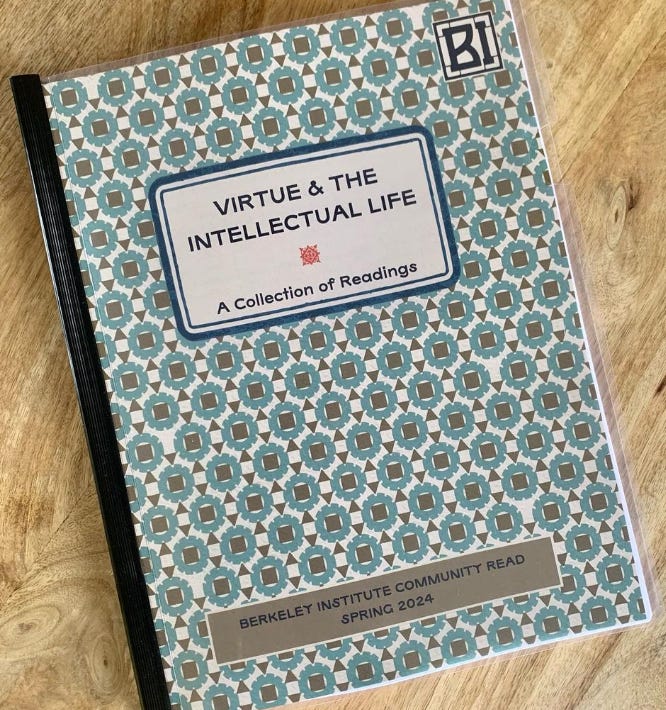Virtue and the Intellectual Life
Download our reader & continue thinking with the Berkeley Institute...
The Berkeley Institute’s Spring 2024 Semester Theme is Virtue and the Intellectual Life. Paired with this, our Spring 2024 Community Read is not a single text, but a full reader, a collection of readings meant to explore this topic. Students can pick up a paper copy at the Berkeley Institute. The rest of our community can download the reader at the link further down in this post. Below, we’re sharing the content from our Spring 2024 Semester guide, which lays out the questions we’re hoping to ask across this semester, and in relation to our collection of readings in particular. Be sure to check out our semester program offerings, which features events for students, faculty, our alumni, and Friends of the Berkeley Institute —and subscribe to receive monthly-ish updates on what we’re doing and thinking about at the Berkeley Institute.
Our 2023 Spring Semester Theme: Virtue and the Intellectual Life
What virtues are required for developing one’s own ideas, for taking the ideas of others seriously, and for forming friendships based on intellectual pursuits? What habits of thought sustain good intellectual work, both in the university and outside of it? And how might cultivating a virtuous life also entail becoming a better thinker and learner?
We ask these questions with the conviction that good intellectual work is not the product of innate abilities, but of disciplined behaviors and habits that allow for the acquisition of certain virtues. For example, learning to truly listen well to another’s argument is not an automatic capability, but requires routine, deliberate practice that develops humility, generosity and patience. This view assumes a difference between who we are and who we must be in order to do what we want to do (e.g. think well, be a good friend, understand the biochemistry of certain bacteria). How do we become the kind of person who does the stuff we want to do well?
The Berkeley Institute is devoting the 2024 spring semester to thinking about “Virtue and the Intellectual Life” and the questions it raises.
Our Spring 2023 Community Read: A Collection of Readings on Virtue
Our collection starts with a chapter from Alasdair MacIntyre’s After Virtue, “On the Nature of Virtues.” We take MacIntyre’s survey of five different accounts of virtue within the Western tradition as a starting point for exploration, and we have paired each with secondary reading selections:
Ben Franklin’s Autobiography with poems by Phillis Wheatley
Homer’s Odyssey with Kierkegaard’s Either/Or
Jane Austen’s Sense and Sensibility with Jamaica Kincaid’s “Girl”
Selections from the New Testament with Flannery O’Conner’s “The Enduring Chill”
Aristotle’s Nicomachean Ethics with Anton Chekhov’s “The Death of a Government Clerk”
As you read these selections consider the following:
1. What emerges across accounts of virtue
What do these different accounts of virtue have in common, and what different ends do they serve? What do they emphasize and what do they omit? What value and assumptions shape their conceptions of excellence?
2. How virtues are defined
Virtues like courage, prudence or temperance can have broad application but have also been narrowly defined and deployed in different historical moments. How do we not lose sight of their value despite their narrow or pejorative associations?
3. The challenge of acquiring virtue
As always at the BI, we want to integrate thinking and living. Our secondary selections explore the temptations, hiccups, deficits and excesses we may encounter in attempting to live virtuously.
What to Consider as You Read…
What are the goals for the cultivation of certain virtues? Are virtues valuable in themselves, or because they provide us with something external? Aristotle, Benjamin Franklin, and the New Testament provide us with different lists of virtues that may assist or preclude the possibility for possessing an external good like money, success or recognition.
Do some people have the capacity to practice virtuous living, while others do not? What should we make of claims that virtues are tied to particular social orders and certain social status?
Can the body aid or preclude our efforts to acquire virtue? One can argue that in “The Enduring Chill,” the suffering body of the protagonist becomes a means for salvation through humility, whereas the strength of the body is lauded by Homer. Do accounts of virtue necessitate a certain conception of the human body?
What historical accounts of specific virtues can aid our efforts to acquire virtue in the contemporary university? The idea of virtue may strike us as an old-fashioned way to discuss moral questions, least of all the habits and ways of life most conducive to intellectual pursuits. But different thinkers and cultures across history have taken for granted the necessity of virtue for living life well; and in recent years philosophy has attempted to recover these traditions for contemporary use. How can learning about different explanations of virtue help us better conform our projects of thinking and living?





